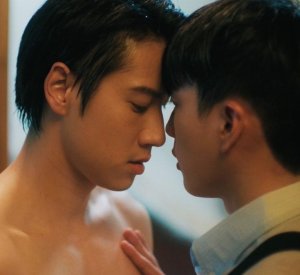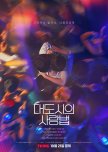Această recenzie poate conține spoilere
when love leaves you, but loneliness stays
This drama? It’s not just a story—it’s an emotional gut-punch from start to finish. From the very first scene, it pulls you into Ko Yeong’s messy, heartbreaking life. He’s the guy who’s always out, chasing the nightlife—bars, dancing, drinking, and one-night stands. On the surface, he’s carefree and fun, but deep down? He’s terrified of being alone. His life feels like this endless loop of trying to drown out the silence, and it’s painful to watch because you can tell he’s running from something he can’t escape.
Let’s address the elephant in the room: Ko Yeong is a walking contradiction. He craves connection but pushes people away. He wants love but fears what comes with it. It’s like he’s caught in this perpetual tug-of-war between what he needs and what he thinks he deserves.
And isn’t it funny how the grass is always greener on the other side? He surrounds himself with noise, people, and distractions, hoping it’ll fill the void, but you can tell he’s longing for something quieter—something real. Yet, when he gets close to it, he bolts. Fear of commitment, fear of rejection, fear of being seen for who he really is—it’s all wrapped up in the way he navigates relationships.
His parents’ messy divorce didn’t do him any favors, leaving him with a skewed idea of what love looks like. Add Kylie—his nickname for HIV—into the mix, and it’s no wonder he struggles to let people in. Kylie isn’t just a condition for Ko Yeong; it’s a shadow that follows him everywhere, whispering that he’s not worthy of love or stability.
Mi Ae, his roommate and best friend, is like his emotional anchor. She’s the one constant in his life, the person who knows him better than anyone else. But let’s not sugarcoat it—anchors don’t float. When she gets married and moves on, Ko Yeong is left to sink or swim. Spoiler: he starts sinking.
Then there are his relationships. Nam Gyu, bless his old-soul heart, was a shot at something tender and genuine. But Ko Yeong wasn’t ready, and Nam Gyu’s tragic end only adds another layer of guilt to Ko Yeong’s already complicated life. Then there’s Youngso, who deserves a medal for Worst Human Ever. He uses Ko Yeong, hides their relationship, and has the audacity to call homosexuality a sin. The betrayal cuts deep, and you can feel how it makes Ko Yeong retreat even further into himself.
And finally, Gyu Ho—the love that could’ve been the love. Their relationship starts off sweet, almost hopeful, like maybe this time it’ll work out. But life doesn’t work that way, does it? The spark dims, the fights start, and the weight of reality crushes them both. Even their trip to Thailand, a place meant to rekindle their connection, is overshadowed by Kylie and all the baggage that comes with it.
Here’s the kicker: Ko Yeong’s life isn’t about grand epiphanies or neatly tied-up endings. It’s about the slow, painful crawl toward understanding yourself. After Gyu Ho leaves for China, Ko Yeong throws himself into writing. It’s his way of processing, of making sense of the mess. But even when he revisits Thailand with someone new, it’s clear he’s still haunted by what he lost.
Love in the Big City doesn’t hand you closure on a silver platter. It’s raw, messy, and brutally honest. It captures the discomfort of being stuck between who you are and who the world expects you to be. It’s a reminder that love, no matter how fleeting or complicated, leaves its mark. And sometimes? The grass isn’t greener—it’s just a different shade of heartbreak.
Heartbreaking, unforgettable, and absolutely worth the emotional wreckage. Watch it. Feel it. Then sit with it, because it’s the kind of story that stays with you, whether you like it or not.
Let’s address the elephant in the room: Ko Yeong is a walking contradiction. He craves connection but pushes people away. He wants love but fears what comes with it. It’s like he’s caught in this perpetual tug-of-war between what he needs and what he thinks he deserves.
And isn’t it funny how the grass is always greener on the other side? He surrounds himself with noise, people, and distractions, hoping it’ll fill the void, but you can tell he’s longing for something quieter—something real. Yet, when he gets close to it, he bolts. Fear of commitment, fear of rejection, fear of being seen for who he really is—it’s all wrapped up in the way he navigates relationships.
His parents’ messy divorce didn’t do him any favors, leaving him with a skewed idea of what love looks like. Add Kylie—his nickname for HIV—into the mix, and it’s no wonder he struggles to let people in. Kylie isn’t just a condition for Ko Yeong; it’s a shadow that follows him everywhere, whispering that he’s not worthy of love or stability.
Mi Ae, his roommate and best friend, is like his emotional anchor. She’s the one constant in his life, the person who knows him better than anyone else. But let’s not sugarcoat it—anchors don’t float. When she gets married and moves on, Ko Yeong is left to sink or swim. Spoiler: he starts sinking.
Then there are his relationships. Nam Gyu, bless his old-soul heart, was a shot at something tender and genuine. But Ko Yeong wasn’t ready, and Nam Gyu’s tragic end only adds another layer of guilt to Ko Yeong’s already complicated life. Then there’s Youngso, who deserves a medal for Worst Human Ever. He uses Ko Yeong, hides their relationship, and has the audacity to call homosexuality a sin. The betrayal cuts deep, and you can feel how it makes Ko Yeong retreat even further into himself.
And finally, Gyu Ho—the love that could’ve been the love. Their relationship starts off sweet, almost hopeful, like maybe this time it’ll work out. But life doesn’t work that way, does it? The spark dims, the fights start, and the weight of reality crushes them both. Even their trip to Thailand, a place meant to rekindle their connection, is overshadowed by Kylie and all the baggage that comes with it.
Here’s the kicker: Ko Yeong’s life isn’t about grand epiphanies or neatly tied-up endings. It’s about the slow, painful crawl toward understanding yourself. After Gyu Ho leaves for China, Ko Yeong throws himself into writing. It’s his way of processing, of making sense of the mess. But even when he revisits Thailand with someone new, it’s clear he’s still haunted by what he lost.
Love in the Big City doesn’t hand you closure on a silver platter. It’s raw, messy, and brutally honest. It captures the discomfort of being stuck between who you are and who the world expects you to be. It’s a reminder that love, no matter how fleeting or complicated, leaves its mark. And sometimes? The grass isn’t greener—it’s just a different shade of heartbreak.
Heartbreaking, unforgettable, and absolutely worth the emotional wreckage. Watch it. Feel it. Then sit with it, because it’s the kind of story that stays with you, whether you like it or not.
Considerați utilă această recenzie?









